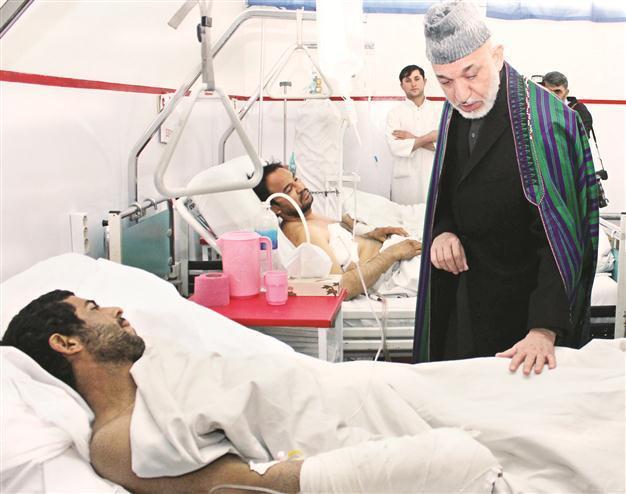US urges Pakistan to act after attacks
KABUL / WASHINGTON

Afghan President Hamid Karzai talks with victims who were wounded in suicide bomb attacks during an Ashura procession that killed more than 50 people. AP photo
The United States Dec. 7 urged greater action by Pakistan against a militant group that Afghanistan blamed for an unprecedented massacre against its Shiite minority.State Department spokesman Mark Toner also confirmed that one U.S. citizen was among the dead in Tuesday’s twin attacks, which Afghan President Hamid Karzai blamed on the banned Pakistani extremist movement Lashkar-i-Jhangvi.
Toner said the United States did not know the full details of the attacks but that Secretary of State Hillary Clinton had Lashkar-i-Jhangvi in mind when she urged Pakistan to act against extremists during an October visit to Islamabad.
“It’s precisely the kind of organization that the Secretary was trying to address when she went to Pakistan in calling for Pakistan to do more to combat this kind of extremist terrorist activity within its own borders,” Toner told reporters. Pointing out that Lashkar-i-Jhangvi has been blamed for attacks in Pakistan as well, Toner said: “It’s clearly a threat to both countries.”
Fifty-five people were killed in Kabul Dec. 6 and another four in a similar attack in the northern city of Mazar-i-Sharif. Another 19 people died Dec. 7 in a roadside bombing in the southern province of Helmand, bringing to 78 the number of people killed in just over 24 hours.
By pointing the finger at the Lashkar-i-Jhangvi militant group, Karzai threatened to ratchet up tensions with neighboring Pakistan, which responded by asking Afghanistan to provide evidence to support the accusation. “We will pursue this issue with Pakistan and its government very seriously,” said Karzai as he visited wounded survivors of the attack after cancelling a planned trip to Britain and rushing home from Germany.
There have been media reports of a purported claim from Lashkar-i-Jhangvi, which is linked to al-Qaeda and blamed for killing thousands of Shiites in Pakistan but not thought previously to have attacked within Afghanistan.
“Lashkar-i-Jhangvi is based in Pakistan, therefore the government of Afghanistan with all its strength and international support will pursue this issue.
Afghanistan cannot ignore the blood of its children,” Karzai said. His spokesman Aimal Faizi said that Karzai will “demand Pakistan take executive measures... so that justice can be done.” But Pakistan foreign office spokesman Abdul Basit urged Afghanistan to furnish proof about the group’s involvement. “Lashkar-i-Jhangvi is a banned organization. We would encourage Kabul to share with us evidence, if any through official channels,” Basit said.
The U.S. Dec. 7 wished Pakistani President Asif Ali Zardari well after aides said he suffered a heart attack and dismissed rumors that the civilian leader was being pushed out. Asked if the U.S. was worried that a quiet coup was underway against the embattled president, Toner said: “No concerns and no reason to believe” the speculation.
“Our belief is that it’s completely health-related,” Toner said. Zardari was expected to undergo further tests in a Dubai hospital yesterday after suffering a minor heart attack that forced allies to deny frenzied resignation rumors. President Zardari’s condition is stable, he is fine, he is OK,” presidential spokesman Farhatullah Babar said yesterday.
















